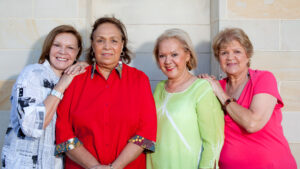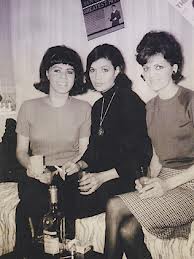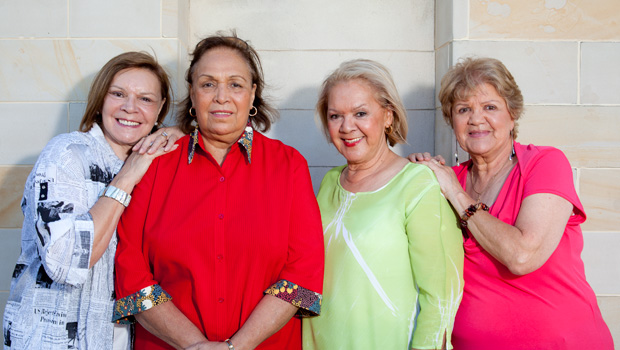Lois Peeler, Naomi Mayers, Laurel Robinson and Beverley Briggs, The Original Sapphires
At a time when Aboriginal women were taking their first steps towards equality it is all the greater an achievement that the Sapphires found success as an all-girl singing group entertaining troops in the Vietnam War. Add to this the race problems that were still prominent in Australia and you have one of the most awe-inspiring tales in the last 50 years.
The early days
 Their life began in a difficult environment which saw Laurel having to leave her home town in search of greener pastures caused by her struggle to find regular employment in her home town, a factor that she attributed to the race problems at the time. The Sapphires didn’t begin life as professional entertainers. As youngsters, their main goal, as was many other Aboriginal girls, was to survive in a society where they were treated as outcasts. In fact, their shows, which ranged from Country and Western to comedy acts, were more for the benefit of friends and family than anyone else. Any concerts that they did do were to earn enough money to survive, rather than in a bid to find fame and fortune.
Their life began in a difficult environment which saw Laurel having to leave her home town in search of greener pastures caused by her struggle to find regular employment in her home town, a factor that she attributed to the race problems at the time. The Sapphires didn’t begin life as professional entertainers. As youngsters, their main goal, as was many other Aboriginal girls, was to survive in a society where they were treated as outcasts. In fact, their shows, which ranged from Country and Western to comedy acts, were more for the benefit of friends and family than anyone else. Any concerts that they did do were to earn enough money to survive, rather than in a bid to find fame and fortune.
A moral dilemma
After catching the eye of an Irish talent scout with vision the Sapphires made the transition from Country to Soul and their career began. However, it wouldn’t be long before the girls faced more difficulty, this time in the form of a decision as to whether to sing in Vietnam. Both Naomi and Beverly were vocal opponents of the war and as such, refused to go. It was at this time that Beverly’s sister Lols joined Laurel and they embarked on the adventure together.
Unlikely stars
 The sheer notion of an Aboriginal all girls group-finding success in 1960’s Australia would have made many laugh at the time. Seen as outcasts, many were still the victims of racism and it’s fair to say it wasn’t the most pleasant of environments for Aborigines to live in. That is what makes the story of these women all the more rousing. Whilst they no doubt saw a chance to escape a difficult life and so grabbed it with both hands. It’s unlikely that they could have foreseen the impact that they would have and the giant steps towards all aboriginal equality that they themselves would have played a part in.
The sheer notion of an Aboriginal all girls group-finding success in 1960’s Australia would have made many laugh at the time. Seen as outcasts, many were still the victims of racism and it’s fair to say it wasn’t the most pleasant of environments for Aborigines to live in. That is what makes the story of these women all the more rousing. Whilst they no doubt saw a chance to escape a difficult life and so grabbed it with both hands. It’s unlikely that they could have foreseen the impact that they would have and the giant steps towards all aboriginal equality that they themselves would have played a part in.
An inspiration for a generation
Since taking to the recording room the original Sapphires have returned to Australia where they now work in the Aboriginal medical service. However, these incredible women’s legacy isn’t so much about their success as singers as their success as Aboriginal females in the late 1960’s. Whilst the Sapphires are now enjoying life by working in the health industry, their story still serves as an inspiration and has no doubt played a role in the success of many other aboriginal entertainers, specifically women, who have gone on to conquer and to achieve their goals in a variety of different fields since the Sapphires set the benchmark.
A movie about The Sapphires was released in 2012, “Laurel Robinson, Beverly Briggs and Naomi Mayers are the three original members of the Sapphires, the first popular Aboriginal all-female group. The movie based on the band’s story is now the most successful Australian film of 2012. Laurel’s son Tony Briggs wrote the play it is based on, and adapted that into a screenplay.
The film depicts the Sapphires as Australia’s answer to the Supremes, and how they were talent-spotted to perform soul numbers for the troops in Vietnam. In reality, it was only Laurel, then 21, and her sister Lois who went to Vietnam. Lois was drafted in when Naomi and Beverly (who are also sisters) refused to go in protest against the war. The three original members – Laurel, Beverly and Naomi – now work at the Aboriginal Medical Service, in Sydney’s suburb of Redfern, where Naomi is chief executive. Here is an edited transcript of our interview with them. “ (Laurel Robinson)


